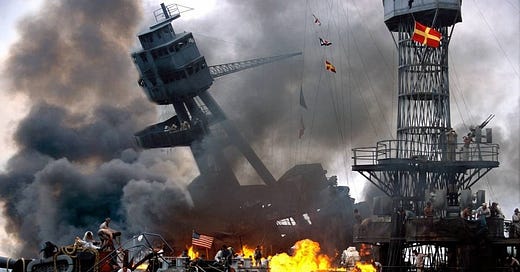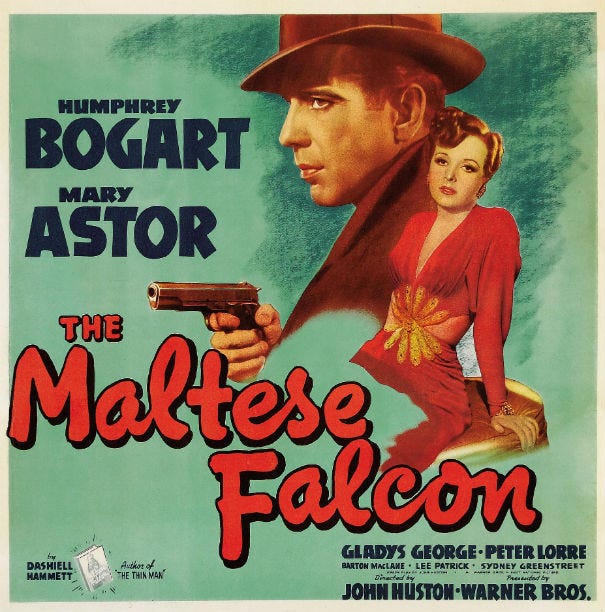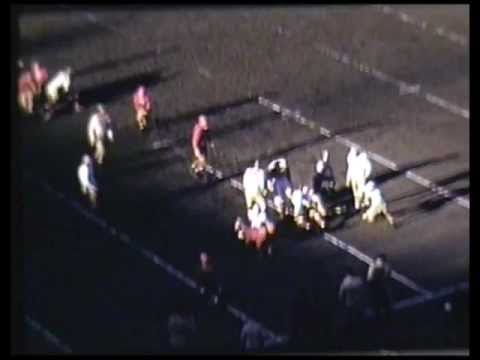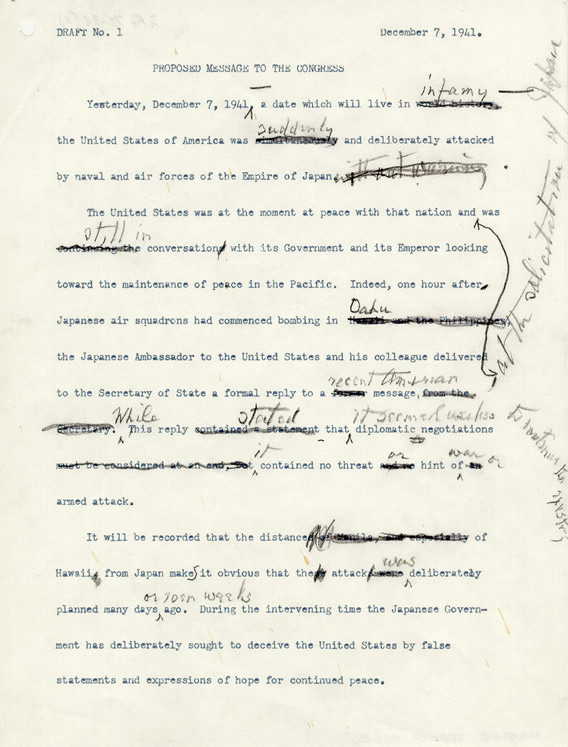Defenseless Under the Night, Our World in Stupor Lies…
A Reflection on Pearl Harbor and Today
For many Americans this is a time of peace, our military is out of Afghanistan with only a minimal number of advisors in Iraq and Syria, even the Navy’s recent battles against Yemen’s Houthi seem like they happened long ago. Of course it doesn’t matter to most to most Americans, the Russian assault on Ukraine, it’s infringement on our NATO allies, and its interference in our elections doesn’t matter. Only the illusion of peace matters.
For most Americans, so long as their economic needs appear to be safe, or the President elect backs their revanchist social and religious policies and inflicts them on other Americans, all is well. To those who believe that everything is okay I say bullshit. It is not okay.
But, since we live in a dream world an illusory world of peace, the words of W.H. Auden come to mind. In his poem September 1st 1939 he wrote:
Defenseless under the night
Our world in stupor lies…
On December 6th 1941 the world was already at war and the United States was edging into the war. The blood of Americans had already been shed by the Germans and the Japanese, but for the vast majority of Americans the events in Europe and Asia were far away and not our problem. Even in 1941 American isolationists and Fascists, led by men like Charles Lindberg and prominent Republican Senators and Representatives, as well groups as the German Bund, the KKK, and the Silvershirts tried to tip the American Public into supporting the totalitarian regimes of Germany, Japan, and Italy.
Though President Roosevelt had began the expansion of the military in 1940, there were those in Congress seeking to demobilize troops who fought all attempts aid Great Britain against the Nazis, the Italian Fascists, and the Japanese warmongers.
Instead, most Americans went about their business on December 6th, the last furtive day of peace without a second thought. People went about doing their Christmas shopping, going to movies like The Maltese Falcon staring Humphrey Bogart or the new short Tom and Jerry cartoon, The Night Before Christmas.
Others went to football games. UCLA and USC had played their annual rivalry game to a 7-7 tie, Texas crushed Oregon in Austin by a score of 71-7 while Texas A&M defeated Washington State in the Evergreen Bowl in Tacoma by a score of 7-0.
In Europe a Soviet counter-offensive was hammering a freezing and exhausted German Wehrmacht at the gates of Moscow. U-Boats were taking a distressing toll of ships bound for Britain including neutral US merchant ships and warships, including the USS Reuben James, and USS Kearney. American Airmen were flying as the volunteer Flying Tigers for the Nationalist Chinese against the Japanese invaders. Other Americans volunteers to fight alongside the British Royal Air Force as volunteers in the 71st, 131st, and 133rd Eagle Squadrons against the German Luftwaffe. After war was declared these squadrons became part of the U.S. Army Air Corps.
War was everywhere but most Americans lived under the illusion of peace. When the messages came out of Pearl Harbor the next morning it was already early afternoon on the East Coast. The Japanese Ambassador was intentionally delayed by his government in delivering the Japanese declaration of war. When the attack occurred many people across the country were going about their Sunday business. They went to church, or relaxing while listening to the radio. Thus when war came, despite all the precursors and warnings, most Americans were taken by surprise. A sailor at Pearl Harbor was heard to remark “I didn’t even know they were mad at us.”
The attack took the nation by surprise. Walter Lord wrote in his classic account of the Pearl Harbor attack Day of Infamy: “A nation brought up on peace was going to war and didn’t know how.” Unfortunately, even after two decades of American military personnel fighting wars, and the evidence of Russian aggression, to paraphrase George Patton, most Americans seem to understand less about war than they do about fucking.
By the end of the day over 2400 Americans were dead and over 1200 more wounded. The battleships of the Pacific Fleet were shattered. 4 sunk, one grounded and 3 more damaged. 10 other ships were sunk or damaged in the attack. 188 aircraft were destroyed and 159 damaged. That day the Japanese attacked American forces in the Philippines, and the British in Hong Kong and Malaya.
The next day President Franklin D. Roosevelt called the nation to action requesting that Congress declare war on Japan. It was a speech that galvanized the American public.
Mr. Vice President, and Mr. Speaker, and Members of the Senate and House of Representatives:
Yesterday, December 7, 1941 — a date which will live in infamy — the United States of America was suddenly and deliberately attacked by naval and air forces of the Empire of Japan.
The United States was at peace with that Nation and, at the solicitation of Japan, was still in conversation with its Government and its Emperor looking toward the maintenance of peace in the Pacific. Indeed, one hour after Japanese air squadrons had commenced bombing in the American Island of Oahu, the Japanese Ambassador to the United States and his colleague delivered to our Secretary of State a formal reply to a recent American message. And while this reply stated that it seemed useless to continue the existing diplomatic negotiations, it contained no threat or hint of war or of armed attack.
It will be recorded that the distance of Hawaii from Japan makes it obvious that the attack was deliberately planned many days or even weeks ago. During the intervening time the Japanese Government has deliberately sought to deceive the United States by false statements and expressions of hope for continued peace.
The attack yesterday on the Hawaiian Islands has caused severe damage to American naval and military forces. I regret to tell you that very many American lives have been lost. In addition American ships have been reported torpedoed on the high seas between San Francisco and Honolulu.
Yesterday the Japanese Government also launched an attack against Malaya.
Last night Japanese forces attacked Hong Kong.
Last night Japanese forces attacked Guam.
Last night Japanese forces attacked the Philippine Islands.
Last night the Japanese attacked Wake Island. And this morning the Japanese attacked Midway Island.
Japan has, therefore, undertaken a surprise offensive extending throughout the Pacific area. The facts of yesterday and today speak for themselves. The people of the United States have already formed their opinions and well understand the implications to the very life and safety of our Nation.
As Commander in Chief of the Army and Navy I have directed that all measures be taken for our defense.
But always will our whole Nation remember the character of the onslaught against us.
No matter how long it may take us to overcome this premeditated invasion, the American people in their righteous might will win through to absolute victory. I believe that I interpret the will of the Congress and of the people when I assert that we will not only defend ourselves to the uttermost but will make it very certain that this form of treachery shall never again endanger us.
Hostilities exist. There is no blinking at the fact that our people, our territory, and our interests are in grave danger.
With confidence in our armed forces- with the unbounding determination of our people- we will gain the inevitable triumph- so help us God.
I ask that the Congress declare that since the unprovoked and dastardly attack by Japan on Sunday, December 7, 1941, a state of war has existed between the United States and the Japanese Empire.
The day after the attack, Japanese Ambassador Oshima visited German Foreign Minister Von Ribbentrop to pressure Germany into joining the war. But Joachim von Ribbentrop attempted to keep Germany out of the war fearing that adding the United States to the List of Germany’s opponents would doom them to defeat. He was overruled by Hitler, whose personal loathing of Roosevelt, disrespect for the American military, overestimation of Japan’s military and industrial power, and belief that Japan would quickly defeat Britain and the United States in the Pacific guided his action.
On December 11th, Germany and Italy declared war against the United States, while Germany’s erstwhile ally Japan, refused to declare war on the Soviet Union to relieve the pressure on Germany. Japan and the Soviets maintained their non-aggression pact until after the Americans dropped the Atomic Bomb on Hiroshima. Then and only then did the Soviets join the war against Japan.
Today, despite suffering three-quarters of a million casualties, Putin’s Russian armies, now aided by thousands of North Korean soldiers are continuing to attack Ukraine. The Ukrainians are fighting the attacks of Putin, who is also our declared enemy, for us. Eleanor Roosevelt reflected:
“Lest I keep my complacent way I must remember somewhere out there a person died for me today. As long as there must be war, I ask and I must answer was I worth dying for?”
Wars, revolutions and other tensions in other parts of the world threaten on every side, but most Americans live under the illusion of peace. A very few professionals are given the task of preparing for and fighting the wars that our politicians, business leaders, Armageddon seeking preachers and the talking heads of the media sow the seeds of. As such most Americans have no idea of the human, material and spiritual cost of war and when it comes again in all of its awful splendor, and few will be prepared for it.
We do not know what tomorrow will bring and unfortunately for the vast bulk of Americans, the comments of W. H. Auden are as applicable today as they were on December 7th 1941: Defenseless under the night, Our world in stupor lies…
Personally, I cannot imagine Donald Trump taking the stand that Franklin Delano Roosevelt did. against Germany, Japan, and Italy, nor could I imagine his supporters abandon him even if it meant the loss of every American ideal, law, and institution. That is difficult for a member of the Trump cult to stomach, but not so difficult if one believes the ideals of the Declaration of Independence, the Constitution, or the Gettysburg Address.
The question is, what do you stand for?











Out of suffering arises a perfect poem by Auden and an excellent historical essay by Steven Dundas!
When in doubt, sharpen your skills and perspective and resolve.